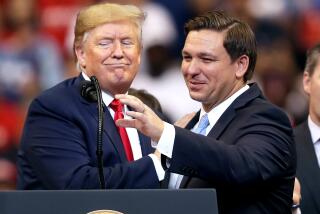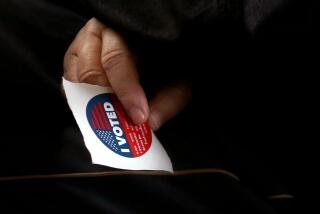Bush Finds What It Takes to Beat Loser Image
- Share via
In politics it’s axiomatic that the best way to erase a “loser” image is to win. By that measure Vice President George Bush’s stunning string of primary victories is one of the cleanest erasures in recent political history.
He hasn’t just won--he has blown his opponents out of the water. Al Haig, Pete Du Pont and Jack Kemp all dropped out without winning any primaries. Bob Dole won a single Midwestern state, Iowa, but that was in caucuses, not a primary. Pat Robertson’s vaunted “invisible army” keeps getting more invisible; he carried only the poorly attended caucuses in Washington state. Otherwise, it was Bush all the way from Massachusetts to Mississippi, North Carolina and Nevada and now decisively in Illinois.
Winning party primaries hardly guarantees victory in a general election--just ask Presidents McGovern and Mondale. But when it comes to establishing a candidate’s electability, winning is a lot better than losing. Having lost to Bush in 20 out of 20 primaries, Dole sounds less convincing as he portrays himself as the stronger candidate for November.
Having presumptively won the nomination this early presents Bush with both problems and opportunities. Hard-fought primaries strengthen and temper a campaign staff; the combat experience becomes invaluable in the shorter, more intensive general election. While Bush coasts through the remainder of the pre-nomination season, the eventual Democratic nominee’s staff will be gaining real-time battle experience.
But the months between now and nomination will give Bush time to concentrate on where he wants to take the country in the 1990s and to hone his approach to the issues. This is crucial to a successful transformation from loyal vice president to prospective President, and from spokesman for the Reagan Administration to leader of a Bush Administration.
For a vice president particularly, it’s tough to make such a transformation while fighting for the nomination. Yet it’s essential to do so before the campaign against the other party’s nominee begins.
When anything becomes conventional wisdom in the salons of political fashion, that’s the time to look at it skeptically. The conventional wisdom has been that Bush was the least electable Republican candidate. So far in the race, he has proved the strongest. He’s done this partly through superior organization and partly through skillful damage control--both major assets in a nominee and in a President. But part of it must also be personality.
The solons of the fashionable salons nodded that Bush was too bland, not forceful enough. Yet there is clearly something about him that voters like.
Maybe they find his obvious decency, courtesy and responsibility refreshing.
Maybe they like the fact that he has never been a hater or an excluder. He’s not one of those rabid preachers of Republican fire and brimstone who draw lines in the dust and challenge all comers to conform or get out--who say, in effect, “If you’re not with me, you’re against me.” It’s more Bush’s style to say, “If you’re not against me, you’re with me.” And that’s one way pluralities are converted into majorities.
Maybe they’ve learned to respect him.
Bush is highly intelligent, well-seasoned in both politics and government. He’s not so much moderate as prudent, the sort who wants to know where the exit is before he lets a door close behind him. He’s not an innovator in the world of ideas. But he does reach out for them, and he has the capacity to adopt and adapt ones that fit within his own conceptual framework. He attracts good people and has shown an ability to use them well. And beneath the courtly exterior there’s an intensely competitive spirit. All this augurs well for his future both as candidate and--if he wins--as President.
Al Haig, Pete Du Pont, Jack Kemp, Pat Robertson and Bob Dole--all substantial figures in their own right--have discovered the hard way that Bush is something more than the Clark Kent of American politics. Come November the Democratic candidate, too, may grow wary of telephone booths.
More to Read
Get the L.A. Times Politics newsletter
Deeply reported insights into legislation, politics and policy from Sacramento, Washington and beyond. In your inbox twice per week.
You may occasionally receive promotional content from the Los Angeles Times.










